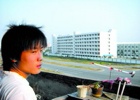In English, the term is “sweat shop.” The Chinese term is Ë°ÄʱóÂ∑•ÂéÇ, which is translated as “blood and sweat factory.” In other words, more than just sweat is left on the factory floors in China. According to Wikipeida: a “sweatshop is a factory, usually in a third-world country, where people work for a very small wage compared to their first-world counterparts, producing a variety of products such as clothes, toys, shoes, and other consumer goods. The term is usually used as a pejorative, and connotes a factory in which the workers may be kept in a harsh environment with inadequate ventilation, and may sometimes be abused physically, mentally, or sexually, subjected to long hours, harsh or unsafe conditions, and the like.”
The following is a translation of an article in Nanfang Weekend.
On this day, there was no activity at the factory. Luo Zhanglin and Luo Ming just hung around the factory gate to chat with the gatekeeper. Sometimes, they sat on the ledge of the flower bed; sometimes, they simply squatted on it. They used their common dialects to discuss their daily lives and work, and about incomes and expenditures.
At that moment, a pedestrian came by to ask for directions. They were very familiar with the place. “The two tallest buildings over there is Shangyi,” Luo Zhanglin who was wearing a white t-shirt stood up and pointed southwards down the road. “But why are you going there? There is nobody there.”
Shangyi Shoe Enterprises Limited used to be the largest factory in Xianan Number 2 village in the Nanhai district of Foshan city. Half a year ago, this Taiwan-capital factory closed and the owner has disappeared. The Guangdong province Labor and Social Security Bureau announced last month that the company owed wages to more than 1,700 employees to the amount of more than 480 million yuan. At the same time, they also announced that another 19 enterprises have seriously violated the labor protection laws and regulations.








